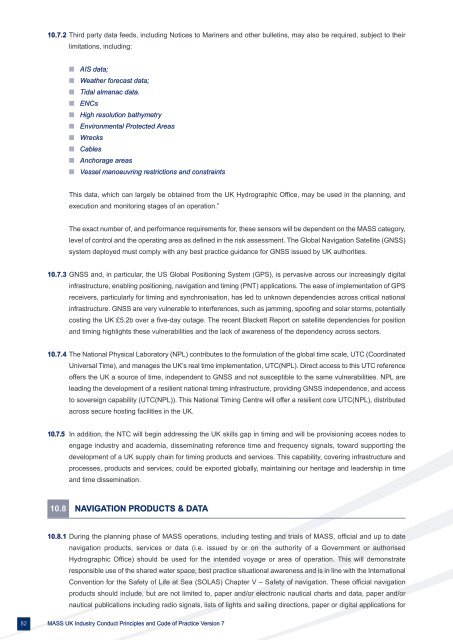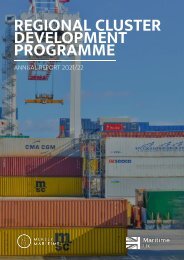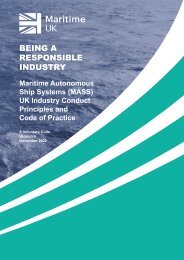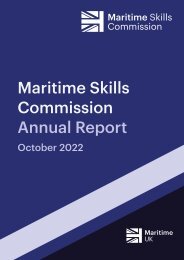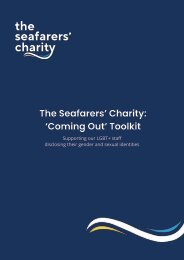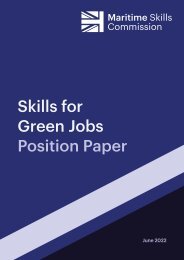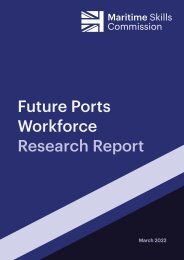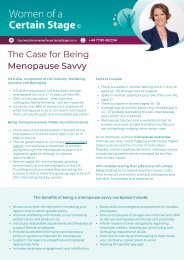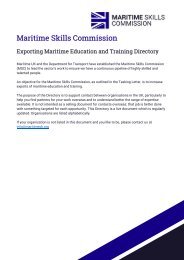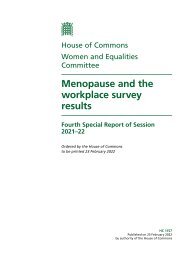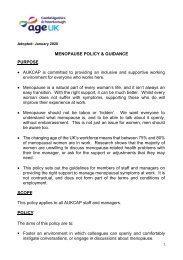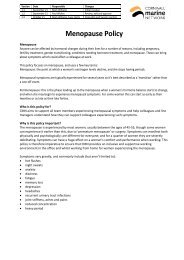COP_2023_V7_pages
You also want an ePaper? Increase the reach of your titles
YUMPU automatically turns print PDFs into web optimized ePapers that Google loves.
10.7.2 Third party data feeds, including Notices to Mariners and other bulletins, may also be required, subject to their<br />
limitations, including:<br />
n AIS data;<br />
n Weather forecast data;<br />
n Tidal almanac data.<br />
n ENCs<br />
n High resolution bathymetry<br />
n Environmental Protected Areas<br />
n Wrecks<br />
n Cables<br />
n Anchorage areas<br />
n Vessel manoeuvring restrictions and constraints<br />
This data, which can largely be obtained from the UK Hydrographic Office, may be used in the planning, and<br />
execution and monitoring stages of an operation.”<br />
The exact number of, and performance requirements for, these sensors will be dependent on the MASS category,<br />
level of control and the operating area as defined in the risk assessment. The Global Navigation Satellite (GNSS)<br />
system deployed must comply with any best practice guidance for GNSS issued by UK authorities.<br />
10.7.3 GNSS and, in particular, the US Global Positioning System (GPS), is pervasive across our increasingly digital<br />
infrastructure, enabling positioning, navigation and timing (PNT) applications. The ease of implementation of GPS<br />
receivers, particularly for timing and synchronisation, has led to unknown dependencies across critical national<br />
infrastructure. GNSS are very vulnerable to interferences, such as jamming, spoofing and solar storms, potentially<br />
costing the UK £5.2b over a five-day outage. The recent Blackett Report on satellite dependencies for position<br />
and timing highlights these vulnerabilities and the lack of awareness of the dependency across sectors.<br />
10.7.4 The National Physical Laboratory (NPL) contributes to the formulation of the global time scale, UTC (Coordinated<br />
Universal Time), and manages the UK’s real time implementation, UTC(NPL). Direct access to this UTC reference<br />
offers the UK a source of time, independent to GNSS and not susceptible to the same vulnerabilities. NPL are<br />
leading the development of a resilient national timing infrastructure, providing GNSS independence, and access<br />
to sovereign capability (UTC(NPL)). This National Timing Centre will offer a resilient core UTC(NPL), distributed<br />
across secure hosting facilities in the UK.<br />
10.7.5 In addition, the NTC will begin addressing the UK skills gap in timing and will be provisioning access nodes to<br />
engage industry and academia, disseminating reference time and frequency signals, toward supporting the<br />
development of a UK supply chain for timing products and services. This capability, covering infrastructure and<br />
processes, products and services, could be exported globally, maintaining our heritage and leadership in time<br />
and time dissemination.<br />
10.8 NAVIGATION PRODUCTS & DATA<br />
10.8.1 During the planning phase of MASS operations, including testing and trials of MASS, official and up to date<br />
navigation products, services or data (i.e. issued by or on the authority of a Government or authorised<br />
Hydrographic Office) should be used for the intended voyage or area of operation. This will demonstrate<br />
responsible use of the shared water space, best practice situational awareness and is in line with the International<br />
Convention for the Safety of Life at Sea (SOLAS) Chapter V – Safety of navigation. These official navigation<br />
caption<br />
products should include, but are not limited to, paper and/or electronic nautical charts and data, paper and/or<br />
nautical publications including radio signals, lists of lights and sailing directions, paper or digital applications for<br />
82<br />
MASS UK Industry Conduct Principles and Code of Practice Version 7


